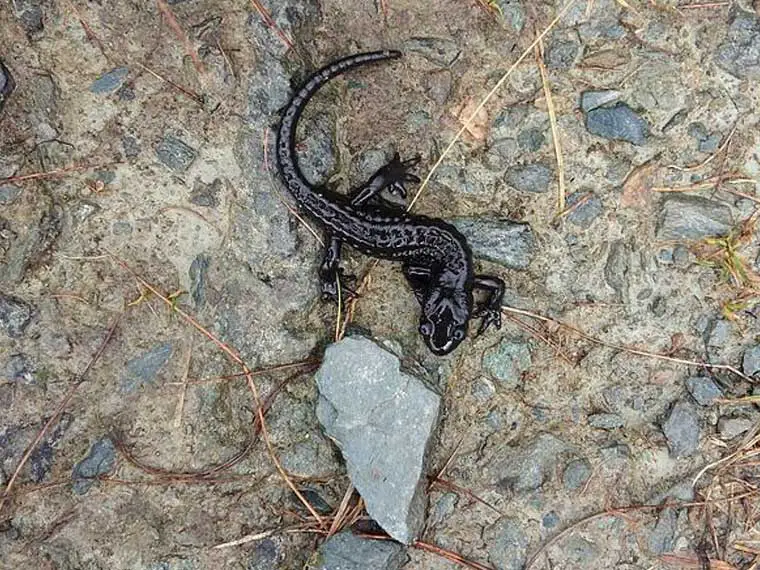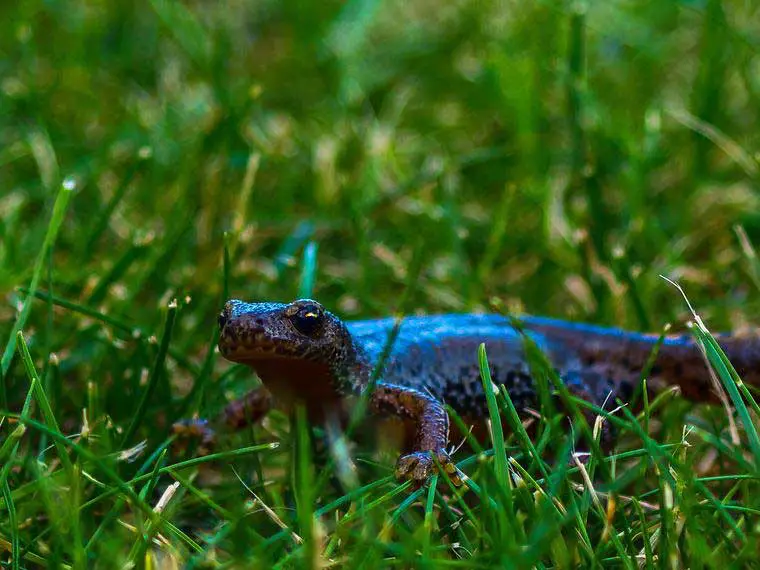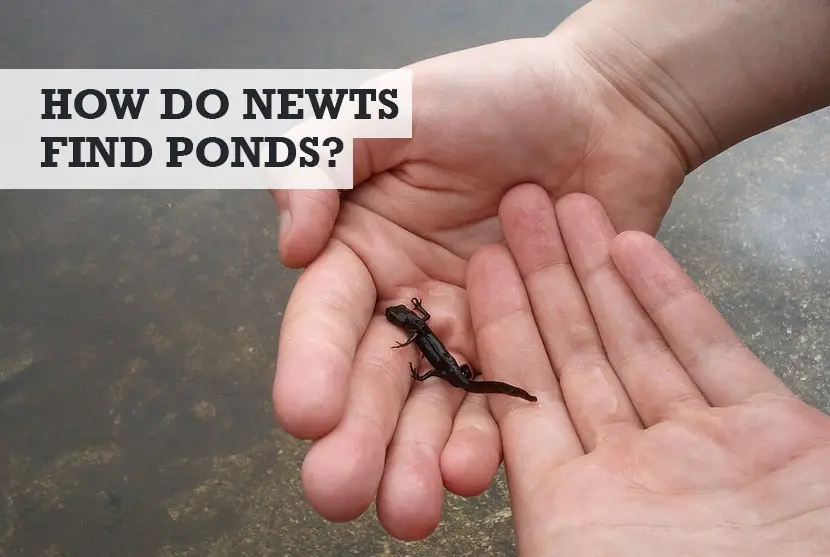Between the Spring and Summer seasons, newts will often be on the move to find a pond to breed in. If you have water in your yard or garden and have noticed some new arrivals, you could be confused by how newts got in your pond.
It can quite a bizarre event when you consider there are no other ponds (as far as you know) in a short distance to you. So just how do newts find ponds?
Newts will get in your pond for a range of reasons including their sense of smell and being able to find a pond from up to 500 metres away. Newts also find ponds by listening out for other amphibians, as this will alert them to the fact there’s water nearby.
That’s the short answer, but the actual mechanics of newt navigation is fascinating. Below I’ve put a lot more detail together so you can get to understand your amphibian visitors a lot better.
How do newts get into ponds?
Whether you want newts or not in your garden, they will often find ponds. If wish to attract them to your water, there’s advice lower down the page. You will need to be patient though, as it can take a couple of years for newts to find your new pond.
Newts have a variety of skills that let them end up in ponds.
1. Finding a pond using their sense of smell
In much the same way as frogs do, newts can find ponds due to the smell and humidity coming off the water. They will sniff out neutral to slightly alkaline odours and make a march to it, to find the perfect breeding area.
It’s also possible that newts will smell prey and then follow it back to the water source. This can be insects who are gathering at a pond, and unwittingly setting themselves up to be a tasty snack for a hungry newt.
Newts will eat insects, slugs, and dead worms on the ground, and tadpoles, water snails, and small crustaceans when in the water.

2. Finding a pond using their hearing
Smooth newts have also been observed in finding ponds by listening out for other amphibians, in study referenced it was the mating calls of toads. By hearing toads mating in the distance, newts know the activity must be taking place at water.
If you have toads getting it on in your garden, it could be how newts get in your pond as they will follow the noise straight to the party.
3. Perhaps the eggs were already there
You could even have mysterious newts suddenly appearing in your pond if perhaps eggs had previously been laid there. A female newt can lay between 200 and 300 eggs into the hidden folds of a water plant, which will then hatch after 14 to 21 days.
This sudden influx of newts could be because it’s their home and a rogue mother newt visited without you knowing.
4. Newts dropped by a predator
A solo newt could also end up in your pond after being dropped by a predator. It’s not unthinkable that a bird could snatch up a newt from one pond, and then lose grip of it near your yard and garden.
Once the newt is safely back on terra firma, his priority will be safety, so finding your pond and getting into the water would be the perfect hiding place.

Why newts find new ponds
Now we know how newts in your pond, the question is why.
Well, if we look at crested newts as an example, they can travel as far as 500 metres to find a new pond.
Why they travel this distance is due to breeding. Newts like to migrate to ponds to meet another newt of the opposite sex. This migration will start around February and March when the weather starts to become milder.
Newts will also only tend to arrive in a new pond once other amphibians have left. The newt breeding cycle is later than that of toads and frogs.
FAQs on newts finding ponds
Now the newts have ended up in your pond, it’s wise to understand these creatures a little better. Here’s a lowdown for you with the most common questions you will need answers to.
What ponds do newts like?
Newts like to find ponds that have a slope, so it makes it easier for them to enter the water. Newts also like ponds with plants in the water to hide in and wrap their eggs around such as water forget-me-nots (Myosotis scorpioides) and water mint (Mentha aquatica).
Newts also like ponds that have plants around the outside for them to hide in, or even a pile of sticks or wood for winter hibernation.
They will try to avoid ponds with fish, as fish will prey on young newts.
Where do newts hide in ponds?
You might not realise that newts have already found your pond, because they are rather good at hiding, particularly when they see the shadow of a human approaching.
If you want to find them, they could be hiding under some weed, a rock, or in a deeper area of the pond until you leave.
Most of the time though, newts like to hide in shallow ponds and the muddy banks when they are not on land.
Do newts stay in pond all year?
No, newts don’t stay in ponds all year. Once a newts get into your pond in the summer, they will stay until winter. When winter comes, they need to protect themselves from freezing temperatures, so will hibernate.
Where do newts hibernate?
When the weather gets cold in winter, newts will look to hibernate in warmer spots near the pond. The ideal place for a newt to hibernate will be free of frost and safe from predators such as cats and birds.
Newts like to hibernate under logs, leaves, paving slabs, in compost heaps, or those bug hotels and bug houses that kids can make.
What months do newts return to the pond?
Once the colder weather ends, newts will return to the pond around March in time for the spring breeding season and to then lay their eggs during their period up until June.
Newts get into ponds at this time of year and will remain there until the winter, at which point they start the hibernation process.
Are newts good for ponds?
Newts can be good for ponds, and in particular the garden. Newts will prey on slugs and snails, meaning the rest of the garden can flourish better.
However, newts are not great when sharing a pond with fish as they can compete for food.
What do I do with newts in my pond?
If newts get in your pond, I recommend you leave them. If you attempt to take newts from your pond and place them elsewhere, it could transmit disease between the bodies of water.
Some newts are also protected by law. Here’s an overview from the ARC charity.
“Due to enormous declines in range and abundance in the last century, the great crested newt is strictly protected by British and European law which makes it an offence to kill, injure, capture or disturb them; damage or destroy their habitat.”
How do you get newts in your pond?
If you want to attract newts to your pond here are some tips for building the perfect water and land environment for them.
- Leave small gaps in or under garden boundaries so newts can find your pond.
- Encourage plants around the pond to help protect newts from predators.
- Make sure the pond is near areas newts can hibernate in on land such as log piles, compost heaps, loose rocks, and nooks or crannies.
- Place the pond so that it also has some shade.
- Make sure there’s a slope down into the pond into a shallow area for newts to get in and out of.
- Don’t put fish in the pond as they will prey on the eggs and baby newts.
Conclusion
The next time you find newts in your pond unexpectedly, please do give them a warm welcome and don’t try to move them on. The journey they have taken to get into your pond could have been fraught with danger, adventure, and risk… and the chances are, they only came to find a mate!
Great crested newts are a European protected species so should be left alone. Other newts should also be left in place, as moving them can transfer transmissible disease between two water sources and different groups of amphibians.
You might also like…
- Why you can find random seashells in your yard or garden
- Why there’s a frog in your garden when you don’t have a pond
- What do to when you find a turtle in your backyard
Image in header via https://pixabay.com/photos/newt-pond-water-animal-amphibian-642336/

